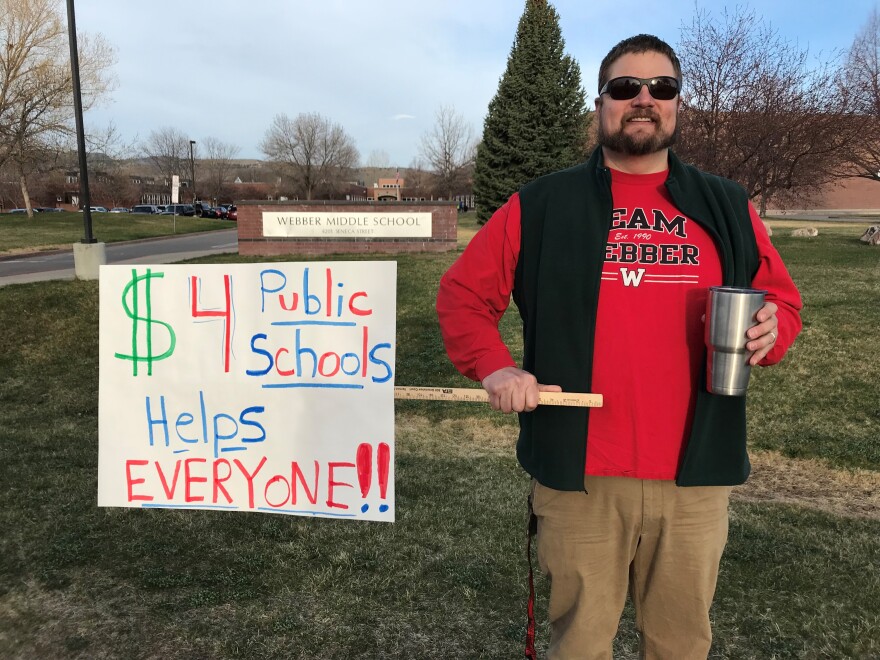A group of teachers stood outside Webber Middle School in Fort Collins before the first bell rang on Monday. They were dressed in red and holding signs with phrases like ‘Education Benefits Everyone’ and ‘My 2nd Job Bought This Sign.’
The teachers were participating in a citywide walk-in to show support for public education.
“We’re not out here to say we need more money because we want to be millionaires, you know,” said Jason Nurton, who teaches reading and an outdoor living class at Webber. “We’re out here saying, ‘give us what we need to do the job.’”
The teachers say they’re working in solidarity with educators around the state, protesting for better school funding, higher teacher pay and increased retirement benefits. While teachers in Northern Colorado staged walk-ins – they walked into school together and taught classes as normal – others chose to walk out.
Dozens of educators descended on the state capitol Monday to rally and talk to lawmakers. There are two important bills moving through the legislature that could impact educator retirement benefits and school funding.

“Meeting the needs of every child K-12”
Senate Bill 200 will modify the Public Employees’ Retirement Association – PERA – due to a financial shortfall. PERA, an alternative to Social Security, is the sole retirement benefit for state employees and more than 53,000 public school teachers.
Colorado has a teacher shortage, and some educators believe that’s partly a result of chronic low pay. In 2016, the state ranked 46th in the nation for average teacher salaries. Strong PERA benefits are a plus to teachers who have decided to work in the state -- and advocates say reducing them could negatively impact the profession.
Tom Tonoli is a retired Poudre School District teacher and past president for the Colorado School and Public Employees Retirement Association. The organization is an advocacy group that works to protect PERA benefits for retired teachers.
“The low pay, I think, is balanced by the retirement plan,” said Tonoli. “(It’s) a very dependable retirement plan. I think that’s a key feature in maintaining people who move into the profession.”
House Bill 1232 would update the current school funding formula – which many education advocates have said is outdated and unequal. More than 170 superintendents worked on the legislation which would increase funding for student factors including poverty, gifted and talented, and special education.
“It’s meeting the needs of every child (K-12) in public education to ensure that we have a future work force and to ensure that they’re ready for their life when they leave us, regardless of which school district we’re in,” said Deirdre Pilch, superintendent of Greeley-Evans District 6.
The superintendents want school funding to be more equitable, but even if the bill is passed, voters would still have to approve funding by the 2022 statewide general election.
“Funding in Colorado is restricted”
Teachers in Colorado have followed the lead of their colleagues in Oklahoma, West Virginia, Arizona and Kentucky. Those educators successfully protested and won increased pay and benefits from their state lawmakers. But Colorado is different. The legislature or governor cannot raise teacher salaries; that authority ultimately is in the hands of the voters.
In 1992, Colorado voters passed the taxpayer’s bill of rights. TABOR prohibits any tax increase without a vote by residents. TABOR, combined with Gallagher Amendment – which sets the ratio between property tax revenue that comes from residential and business property – shifted school funding from local property taxes to the State General Fund. This has led to a drop in per-pupil funding and in 2015, Colorado ranked in the bottom third for funding in the country.

“The way we have funding in Colorado is restricted by TABBOR and the Gallagher Amendment,” said Jacque Kinnick, a social studies and health teacher at Webber. “We’re just trying to raise public awareness on the restrictions on funding for Colorado education.”
Teachers want to get Initiative 93 on the November ballot to increase public school funding. The initiative would receive revenue from a tax increase that is exempt from TABOR and would be used to supplement money from the General Fund.
Kinnick, who participated in the walk-in, isn’t sure if TABOR and Gallagher can be changed but said passing legislation, like Senate Bill 200, is a start.
“We’re just out here with signs saying, ‘hey, support our kids, support or teachers, support public education.’”






